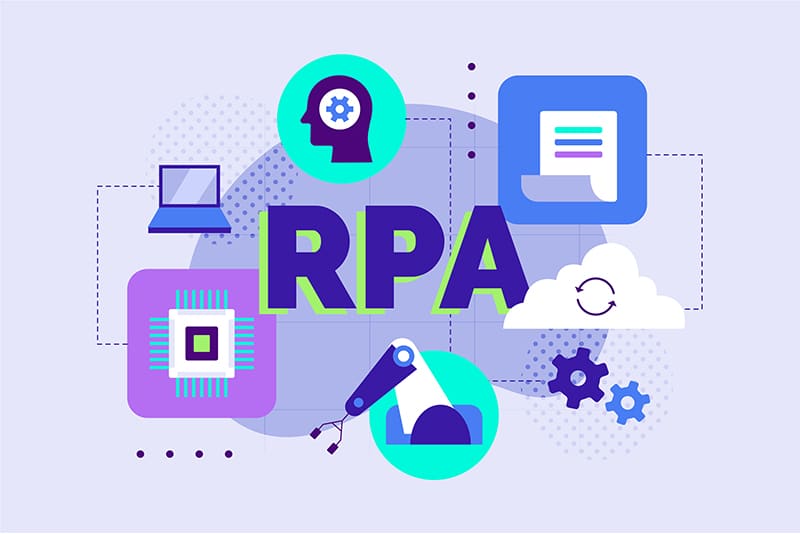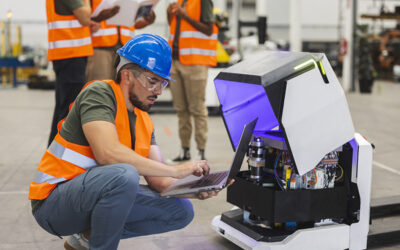Both RPA and AI have a positive effect on the functioning of business and its outcomes. We can say that RPA and AI are a power couple that can digitize and transform enterprises. These two technologies are complementary and businesses can integrate them for enhancing operational efficiency and customer satisfaction. Now, are you thinking about ways to incorporate this technology into your organization? Your journey to complete digitization can be realized with outsourcing services.
So, What is RPA?
RPA is Robotic Process Automation, and the technology uses software robots to coordinate, standardize and automate business processes that are repeatable. In short, with the help of specialized computer programs, the repetitive tasks in business operations are quickly executed. These software robots execute such tasks as instructed with the utmost efficiency. RPA robots can be compared to virtual assistants wherein you can delegate repetitive operations that are simple but consumes most of the employee’s productive time.
RPA performs best when it is programmed to handle rule-based processes. It implies that the workflows don’t change over time. With reference to nice. com, below given are some of the time-consuming processes that can be perfectly handled by RPA.
- Logging into applications
- Connecting to system APIs
- Copying and pasting data
- Extracting and processing structure content from documents
- Opening emails and attachments
- Scraping data from the web
Accuracy and speed stand tall among the advantages of using RPA in your business processes. In addition, it has to be noted that RPA complies with regulatory rules precisely and creates audit trails. The prompt functioning increases the reliability of RPA which works round-the-clock and minimizes the delay.
AI for Businesses Today
AI or artificial intelligence can be referred to as the simulation of human intelligence processes by using computer systems or machines. The processes involved in AI technology include:
- learning the programs by acquiring information and the rules obtained from the given data
- Reasoning by consuming the instructions and information thereby reaching conclusions.
- Correcting any error on its own by analyzing the successes and failures
AI technology finds application in image recognition, speech identification, chatbots, generation of natural language, and analysis of consumer sentiments. It can replace human efforts in businesses by automating the processes involved in businesses. AI can efficiently use unstructured data and use its own reasoning to execute the task. Business process outsourcing services can be relied upon to automate tasks that have unstructured inputs. Businesses can combine RPA and AI to fully automate their operations from end to end.
What are the Features That Distinguish RPA and AI?
| RPA | AI |
|---|---|
| Human actions are mimicked by software robots. It can effortlessly do all the repetitive tasks with accuracy which otherwise had to be managed by humans. | Machines are programmed to simulate human intelligence. AI can think and reason like humans. |
| It operates with a well-defined instruction set by the user. | AI corrects itself by thinking and learning. It learns by success and failures that happen while executing a task. |
| There is no human intelligence in RPA; rather, it depends upon rule-based technology. | The technology includes machine language and natural language processing. |
| Large businesses can rely upon RPA to quickly carry out repetitive tasks without manual inputting | AI also finds application in the decision-making stage of the business process without human intervention. |
| It processes only structured data. | AI can handle both structured and unstructured data. |
| The technology can be easily implemented. Some networks are complex but in comparison with AI, the exchange of information is simpler. | It involves multiple stages of data processing and requires a lot of work to set it up and operate. |
Can RPA and AI Work Together?
Of course, yes!!
The automation strategy for your business is complete when both the technologies work in tandem. When RPA executes all the repetitive tasks, AI will process data and carry out operations with intelligence. Customers prefer end-to-end automation so that they have self-service options.
For instance, assume that a customer wants to start an online trading account. If the entire process, beginning from starting an account to executing the trade is fully automated, there will be enhanced customer satisfaction.
For opening an online trading account, the type of account is verified by the chatbot based on the customer requirements. A link that needs the relevant information of the customer is forwarded by the chatbot to the customer. Once the form is filled, it is handed off to another robot who gears up processes to start a new account. Repetitive tasks like verifying the eligibility of the customer are done by a robot with RPA technology.
The documents uploaded by the customer are analyzed by a smart robot. If there is any discrepancy or anomalies in the given data and the information obtained from the documents, it is sent for human intervention. The robot learns from the inputs given by the humans and adapts to face a similar situation in the future. Again, the validation of uploaded documents continues with the help of text analytics. Natural languages interpret the information to categorize vital data points within the free text.
Now, when the stage of processing is completed, a new trading account is created after scrutinizing the financial details of the customer.
Once the trading firm’s requirements are met, the robot automatically forwards an email to the customer with account and access credentials. Seems quick and easy, right??
Make all your business processes under one roof with automated processes. A business process outsourcing company can bridge your gap in operational efficiency by integrating RPA and AI solutions in your business.




